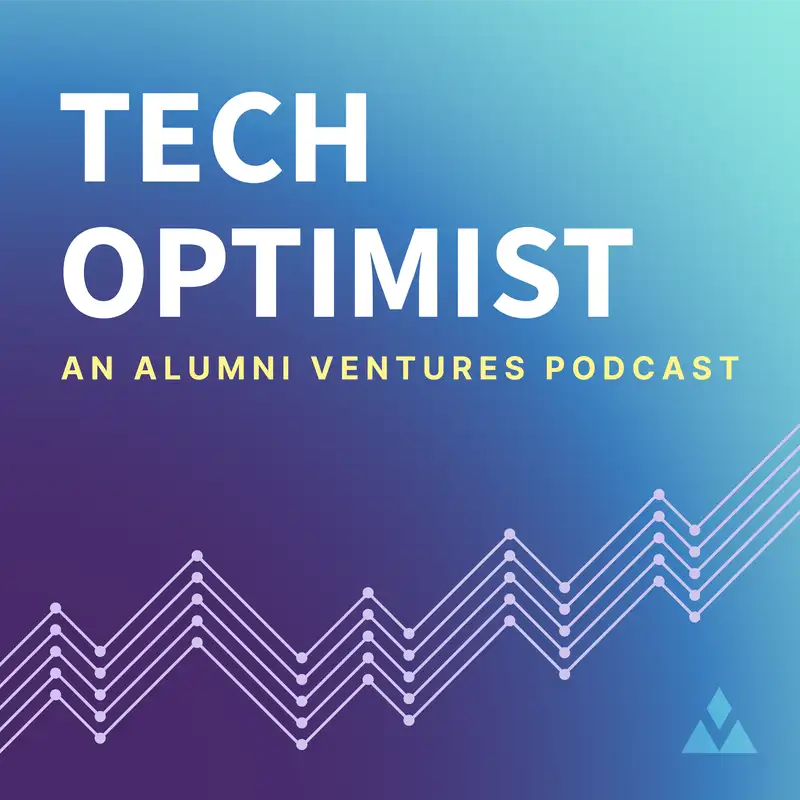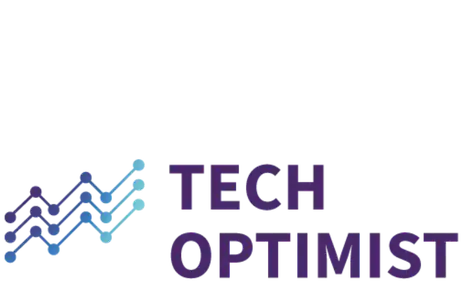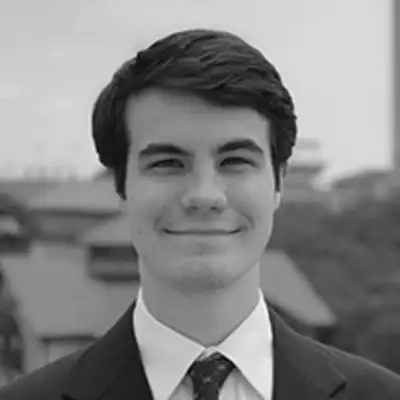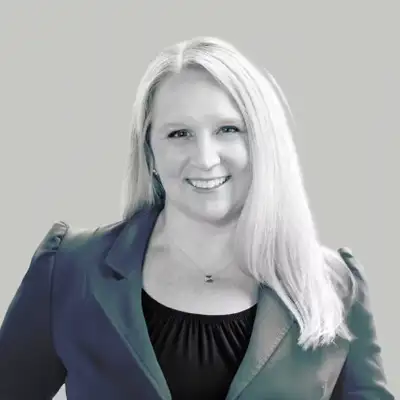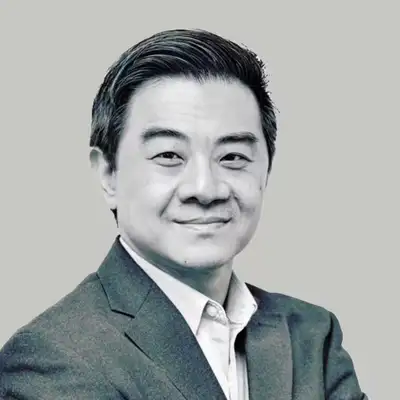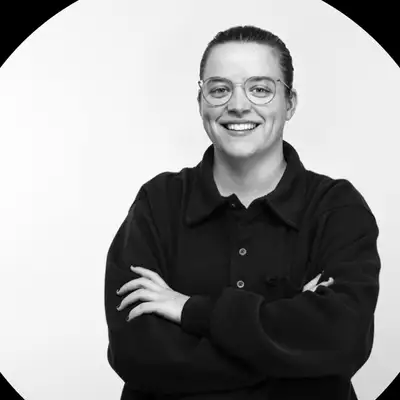#86 - Meet the Startup Redefining Blockchain Speed and Decentralization
Samantha:
Welcome to the Tech Optimist, the podcast where we celebrate ideas that push boundaries and reimagine what's possible. I'm your host, Samantha Herrick, and this is your front row seat to the technology shaping our tomorrow. We'll uncover bold visions and big challenges highlighting stories of innovation that inspire optimism for the future. So whether you're here for the breakthroughs or for the big picture, like we have today, you're in the right place. Let's explore what happens next together.
Alan:
We're innovating in the place of stable coins, as well as making blockchain systems more efficient and usable for real world adoption.
Samantha:
This is Alan Orwick, Co-founder at Quai Network.
Ray:
I still remember those early Zoom calls when you and your team were just starting out at UT Austin, what an incredible journey it has been to get here.
Samantha:
Recurring listeners of the show know that voice, that is Ray Wu, Managing Partner here at Alumni Adventures. And finally, I'm your host, Samantha Herrick. And let me start by saying it's a true honor to be your guide in this journey every episode, through this ever-evolving tech landscape that we all get to witness together. Here on the Tech Optimist, my mission is simple. I dig into the technologies shaping our tomorrow, amplify the voices behind those breakthroughs, and connect the dots between possibility and progress. As your host, I take on the role of a tech translator, cutting through the buzzwords and industry jargon to uncover the heart of the innovations we feature. So behind the mic, I also craft our tech notes, which are very quick, insightful takeaways for every episode designed to keep you informed and inspired, kind of like footnotes you would see in a book. Whether it's a story of this groundbreaking startup today, Quai, the latest trends in AI, or a deeper dive into blockchain's next frontier, which I also will get in today, my goal is to make every conversation meaningful, relatable, and a little bit more exciting. But this podcast isn't about me, it's about you, our community of thinkers, doers, and dreamers. So let's dive in together, use our curiosity as our compass and optimism for our fuel. Let's build the future one idea at a time. Let's hop into it.
The blockchain is one of the most transformative technologies of our era, but it's not without its challenges. Today, we're spotlighting Quai network, a company that's rewriting the rules to solve blockchain's biggest dilemma, the trilemma of decentralization, scalability, and security. Quai started in 2019, not in a corporate boardroom, but in a university research lab at the University of Texas. The founders brought together their expertise to tackle the limitations holding blockchain back. Their innovation, a groundbreaking proof of entropy, minima, consensus mechanism, and a unique three-by-three hierarchical chain structure that allows Quai to achieve over 50,000 transactions per second. Yes, you heard that right, 50,000 transactions. With a dual token system, Quai aims to create a truly decentralized network optimized for global economies and decentralized applications. Their modular EVM compatible chains make it easier for developers to deploy smart contracts while maintaining high performance and resilience. But their journey isn't just about tech.
With $15 million raised, including $8 million from Polychain Capital and 2 million from us at Alumni Ventures, Quai is walking the talk. They're in the testnet stage now with an ambitious Mainnet launch on the horizon, and they're headquartered in Zug, Switzerland, a global hub for blockchain innovation. So why should we care about what Quai Network is building? Because they're not just addressing theoretical problems, they're laying the groundwork for practical, scalable solutions that could redefine the industry. Their approach to blockchain could unlock the potential for everything from decentralized finance to next-gen digital infrastructure. We're going to get into that a little bit later. You're not going to want to miss that part of this conversation.
Today we're going to hear directly from the minds behind Quai Network, Alan Orwick, as you see earlier, and what drives their vision, what challenges have they faced along the way, and most importantly, how do they see the future of blockchain evolving? Stay tuned. I promise, I might say this every episode, but you're really not going to want to miss this one. All right, we've got an ad and a disclaimer, and then we'll give it right away to Ray. Hang tight.
Speaker 4:
Do you think the world economy will increasingly become disintermediated and digital? Invest in this future with Alumni Ventures Blockchain and FinTech Fund, access 20 to 30 innovative startups revolutionizing finance through blockchain and disruptive FinTech ventures. Led by visionary teams and backed by leading investors, these companies are driving the digital transformation of global finance. Invest in the pioneers of decentralized finance and next-gen payment systems. Visit av.vc to learn more.
Speaker 5:
As a reminder, the Tech Optimist podcast is for the informational purposes only. It's not personalized advice and it's not an offer to buy or sell securities. For additional important details, please see the text description accompanying this episode.
Ray:
Today I'm speaking with Alan Orwick, the Co-founder of Quai Network. We're excited to support a company and be a partner on this journey together. Hi, Alan, welcome to the show. First of all, huge congratulations on the launch of your testnet. I still remember those early Zoom calls when you and your team were just starting out at UT Austin. What an incredible journey it has been to get here. Maybe as a starting point, could you please introduce yourself and the Quai Network?
Alan:
Yeah, so Ray, thank you for having me on. Excited to chat more with you today on the podcast. So as you mentioned, I'm Alan Orwick. I'm one of the Co-founders of Quai Network. Quai is a new programmable and scalable proof-of-work blockchain with a crypto native energy dollar. So we're innovating in the place of stable coins, as well as making blockchain systems more efficient and usable for real world adoption. And my background, I've been in crypto since about 2015 and was at UT Austin as a computer science student, where I actually got to start working on research in the blockchain industry in field, that allowed me to connect with professors and other like-minded students that were centering this new group around blockchain and cryptocurrency research. Following my time at UT, I went and worked at Apple as a software engineer and then got the itch to get back into crypto, was able to kickstart some fundraising with the great Alumni Ventures team as well as Polychain Capital, and we've been on this journey with Quai Network primarily in testnet phases, but ramping up now from Mainnet here soon. So it's been a long journey and I'm excited to talk more about it.
Ray:
Great. Thank you. So you mentioned about all those inspirations. Are there any industry catalysts or trend that influenced your decision to start at that time versus before?
Alan:
Yeah, I think we've always been interested in the world of blockchain scalability. So I mentioned that 2018 was kind of the main nexus of the co-founder group for Quai, and we started from a more research perspective and a more research oriented way, in which we started actually with a National Science Foundation grant and an SBIR phase one. And so this research culminated over several years and really got to the point in which we realized this was a viable solution to a problem that the industry faced. And we wanted to create something that was technical, but also solved problems that people are facing whenever they're using this blockchain technology, because we want Quai to be as decentralized as Bitcoin, as fast as Solana, and as programmable as Ethereum. So taking some of the best properties from these existing solutions and almost having a last mover advantage in the space, and something that really provides a lot of value to users that want to have decentralized currencies.
Samantha:
So at this point in the interview, Alan and Ray are starting to dive into Quai Network and how they're challenging the limits of blockchain scalability. So a lot of the insight that I'm going to provide for you right now comes from a fascinating video on Quai's YouTube channel. They're very active on their YouTube channel. They post podcasts type clips every week, and there's a lot of really good content in there. So there are some really good sound bites though that are from a video titled 'Scalable EVM on POW that you can mine with the GPU today' catchy title, so I clicked on it, worked on me. And if you haven't checked out the full video yet, I highly recommend it. It's about four minutes long. So Quai Network's mission is very clear, to create something that's scalable and programmable. As Co-founder Alan Orwick explains, scalability for them, "Means something that can achieve extremely high throughput, anywhere north of 10,000 transactions per second, 50,000 transactions per second and so on." With ambitions to compete against traditional financial giants like Visa and MasterCard.
Then here's what sets Quai apart. They're doing this on a proof-of-work network. While many of the industry have moved toward proof-of-stake, Alan shared, "We see there have to be ways to innovate within proof-of-work." And Quai is leading the charge with a scalable and programmable proof-of-work network that others in the space haven't achieved yet. And it doesn't stop there. Quai has also introduced an energy-based stable coin offering a fresh approach to decentralization. Alan explains, "That every time you give the network one hash, it'll give you the same amount of chi." Which makes it an entirely new way to think about currency tied to blockchain networks. This energy-based stable coin sets Quai apart from other projects that rely on traditional fiat-based models. Quai network is paving the way for a new era of scalable, decentralized technology and will be diving into how this could change the blockchain space as we know it.
Ray:
Yeah, that's great. And then maybe share a little bit in terms of the problem you're trying to solve, and you mentioned all this kind of integrations of different systems make it essentially almost like a combination of various benefits from different blockchains, but maybe share a little bit more in terms of the scenarios and the system, and problem you're solving at this moment.
Alan:
Yeah, great question. So taking a step back and looking at just where crypto has gone today, Bitcoin still rules the whole land. It's the driving force of the market and it's really capturing most mine share as well as market value. You have institutional adoption, you have ETFs, you have pretty much Bitcoin being a default if you want to get into crypto, and it's the 'safer option' compared to other solutions and other forms. But Bitcoin still has its faults. It's ossified in a way that hasn't lent itself to scalability or programmability. It's become more of this digital rock or literal digital gold. We now have many people endorsing this idea of Bitcoin as digital gold and competing directly with gold. And from a usability perspective, most solutions around Bitcoin have failed. Litecoin has failed. A lot of the ways that people are doing programmability on Bitcoin is still very challenging.
So newer solutions have emerged around that. Ethereum was the first to pioneer smart contracts, and even then Ethereum still has high fees and limited interoperability with other solutions, especially in the layer two space. So now they've resorted to fragmentation, and that still is a net negative, because you're having to keep in mind all of these different bridge solutions, you're having bridges constantly get hacked as well, and other security vulnerabilities. And so now people will say, well, I want the speed and I want the liquidity all in one place. So now Solana has captured most of the mine share and most of the attention, but even then, Solana has made specific tradeoffs that sacrifice some of the decentralization guarantees. So Solana has a more concentrated validator set. It has fewer participants that can actually use Solana from a network perspective compared to something like Bitcoin that is more global and robust in that way.
So that's why Bitcoin can be more adopted by the governments. You can see a strategic Bitcoin reserve, because while the United States has some assurances and guarantees that Bitcoin is as decentralized as it is marketed as compared to something like Solana. So fundamentally as an asset, the network actually says something about how it will get adopted and how it will get perceived. And from our perspective with Quai, we want to sit somewhere between that, where we can have the ability to be decentralized, credibly neutral, have a network of validators that are able to exist in many different places across the globe, but also still have very fast transaction times and very low fees with that ease of use, as I mentioned with Ethereum. And the different sort of traits and ways in which we accomplish that are really through looking at the fundamental base layer.
So having Quai Network utilize fundamental breakthroughs of this decentralized technology, one of which is sharding, so we utilize a execution shard approach, and the second being an adaptation of proof-of-work that we call proof of entropy minima. So a way that we can prioritize block inclusion and have a way of immediately resolving forks that extends or could actually be applied to Bitcoin itself. So that's some of the work that we've been doing and addressing across those three examples that I talked about, but there are many other features in the system that we're excited about.
Ray:
Yeah, that's great. And then obviously this proof-of-work is more about energy-based system. So I remember you always talk about the energy-based monetary systems powered by the evolution of proof-of-work. So maybe share a little bit more around that in terms of what problems you can use the technology to solve today.
Alan:
Yeah, so I talked about Bitcoin a little bit. It's already viewed as a store value. So we haven't really found a way of bringing digital cash into these blockchains in a decentralized way. And even looking back into Bitcoin's original ethos, it was advertised and it was talked about as a new form of internet cash or a way of sending payments across a digital environment. And now the main trillion-dollar opportunity that has come into blockchain technology, as opposed to Bitcoin in the space, is stable coins. So stable coins are now emerging as this category of fiat on decentralized rails, and it is almost vampire attacking this decentralized technology, because we've seen ways that stable coins can influence or control these so-called decentralized systems.
Samantha:
Let's dive into these stable coins a bit more, what they mean, how they work and what's going on in this space. So as we dive into stable coins, they are a cryptocurrency designed to maintain a stable value by being pegged to an asset like the US dollar or even gold. They've become crucial players in the world's digital currency and are rapidly growing. With the stable coin market now worth a massive 150 billion. So the biggest names in the space, like Tether and Circle, control about 90% of the market. Tether, for instance, has grown its share from 55% to 75% over the last couple of years, and its supply has doubled to 118 billion. This makes it clear that stable coins are here to stay, whether we like it or not.
So why are they so important? Stable coins offer price stability, which sets them apart from volatile cryptocurrencies like Bitcoin and Ethereum. This makes them more suited for everyday transactions and at a store value. They've gained significant traction, especially in regions with economic instability, offering people access to a reliable digital currency when local currencies fail them. So another huge advantage is transaction efficiency. Stable coins facilitate faster, cheaper transactions compared to traditional financial systems, helping to drive global adoption. Whether you're looking to send money across borders or manage liquidity, stable coins offer an efficient solution. Financial institutions are catching on as well. We're seeing institutional adoption rise as businesses use stable coins for settlements and to enter the cryptocurrency market. This growing trend shows how stable coins are bridging the gap between traditional finance and the crypto ecosystem.
Speaker 4:
Do you have a venture capital portfolio of cutting edge startups? Without one, you could be missing out on enormous value creation and a more diversified personal portfolio. Alumni Ventures, ranked a top 20 VC firm by CB Insights, is the leading VC firm for individual investors. Believe in investing in innovation? Visit av.vc/foundation to get started.
Alan:
So we've looked at solutions that can almost bring back this form of decentralized cash, and we're doing this with proof-of-work. And the key unlock or innovation here is that we can oracleize proof-of-work in a way that represents an energy dollar. And there are, from our perspective, many different ways that this energy dollar can be used. We see this being useful in terms of payments. From an economic perspective, energy is a good source of stability, because it is underlying in the economy. The inflation across all fiat currencies is pretty rampant right now. So if we were to align our monetary system to something closer to true economic value, which we see as energy, that would actually allow the economy to perform better and be more optimized from a mechanic perspective. So from our side, stable coins are a huge unlock, and the energy dollar is a useful tool to bringing stability in a non-fiat related way, in a decentralized way on chain.
Ray:
That's pretty cool. Obviously you're in a testnet right now. Maybe talk a little bit about the progress with the product and the ecosystem right now, and what's coming up next.
Alan:
So we've been in this journey of ramping up to Mainnet for quite some time. It's no secret, we've been building in public for several years now, and the testnet phases have been very telling in terms of the technology. And we want to allow our community and allow people to dog food this in public, because we want this technology to make a lasting impact. So we're in our fourth and final testnet right now. It is called the Golden Age Testnet, and it is incentivized. So you can go get Quai on testnet today. There are several dApps that you can interact with directly. They're swaps, DEXs, Telegram games, NFT exchanges, you name it. Pretty much everything that exists on Ethereum, blockchains or EVM chains you can do on Quai Network today. And our main goal is to ramp up to launch Mainnet here soon and allow for everyone to claim their tokens, and go back and continue to contribute to the ecosystem.
So if you're a Solidity developer and you're tired of hopping across layer twos, we want to come welcome you to the Quai Network and you can come build your application here. And then also, if you're just looking to experiment with new chains and looking to find out new innovations, definitely encourage everyone to come check out Quai and see what we're doing.
Ray:
Great. Then obviously Alumni Adventure has more than 750,000 community members. Do you have any requests for our communities? How can we help you?
Alan:
Yeah, there's a lot of ways. And so of course Alumni Ventures has been a key part in our journey. I remember just being in New York and seeing you a couple of months ago, and talking more about all the things we're doing with Quai. So from our side, we want to encourage everyone in the crypto space to give us feedback. And I said, of course we're building in public, we're doing a lot of these things, and of course we could have done this for so long and not tell anyone about Quai, and then just drop it right when we're doing Mainnet. But we want people to be a part of this journey, and Alumni Ventures in the community is definitely integral to that. So I can encourage people to do the same with testnet and participate in what we're doing, download a wallet and get on chain.
Those are some of the main things, regardless of just with Quai, that I encourage everyone to do, being in crypto and having that financial sovereign capability is a huge thing that everyone should be able to do and really recognize the true value of cryptocurrency. And I think once you kind of get that and you get a wallet, that goes a long way in understanding. So that was, especially for me, one of the main things with Bitcoin was like, wow, I'm in control of this asset and I'm in control of what happens to it.
So same thing for people in the community when they go and check out Quai Network, get a wallet, try testnet tokens, go try to do different things, deploy an application, deploy different types of bots or different things that would be able to interact on chain, and we want to see more of that. So for us, we're also facilitating grants. So if there are people that are exploring these types of solutions, we want to reward them, and we want them to be brought in and incentivized. So definitely apply to our grants program. You can visit our Twitter @QuaiNetwork, you can visit our grants program and our Questbook, and then you can also just follow along our journey in the Discord, and there's tons of different things and ways to get involved.
Samantha:
Interested in anything you've heard today? You can follow along with Quai, again, like Alan had said, on their X, on their Discord, on LinkedIn, all of their links will be in the description, but their website is qu.ai. So it's Quai, but with the dot between the U and the A. So again, that's qu.ai. So get involved.
Ray:
Great. It's just great chatting with you. Obviously it has been a very long interesting journey. I think this is a new wave. Bitcoin just hit a hundred thousand as of yesterday, it's quite historical day essentially. So wonderful too to have you on this podcast. Anything that we did not cover that you want to bring out as the last question?
Alan:
Yeah, I mean, just right now with the market, it's an exciting time. So I think the main thing is just seeing how the rest of the crypto community can come together. I know kind of in the bear market that we've built through and that we've seen as a founder, it's definitely been challenging to have your beliefs and have your assumptions that you make looked at. So now kind of coming across the finish line and seeing everything come to fruition, it's critical that we emphasize the true beliefs of crypto and we stick to it, because I think it's going to get very noisy and very hectic. It's probably going to get a lot crazier from here as we go past 100K. So it's definitely been exciting to see, especially what Alumni Ventures is doing on the portfolio side, and what companies are coming and which ones are newer in the ecosystem that can also potentially contribute to Quai Network and reinforce what we're doing from a bottom-up perspective.
Ray:
Yeah, absolutely. I love to collaborate and build ecosystem together. So has been a pleasure chatting with you and yeah, I really appreciate obviously the information that you shared with our audience, with our community, so wish you the best of luck.
Alan:
Yeah, thank you for having me on, Ray. This has been a great chat.
Ray:
All right. Thanks.
Samantha:
Thanks again for tuning into the Tech Optimist. If you enjoyed this episode, we'd really appreciate it if you'd give us a rating on whichever podcast app you're using, and remember to subscribe to keep up with each episode. The Tech Optimist welcomes any questions, comments, or segment suggestions. So please email us at info@techoptimist.vc with any of those, and be sure to visit our website at av.vc. As always, keep building.
